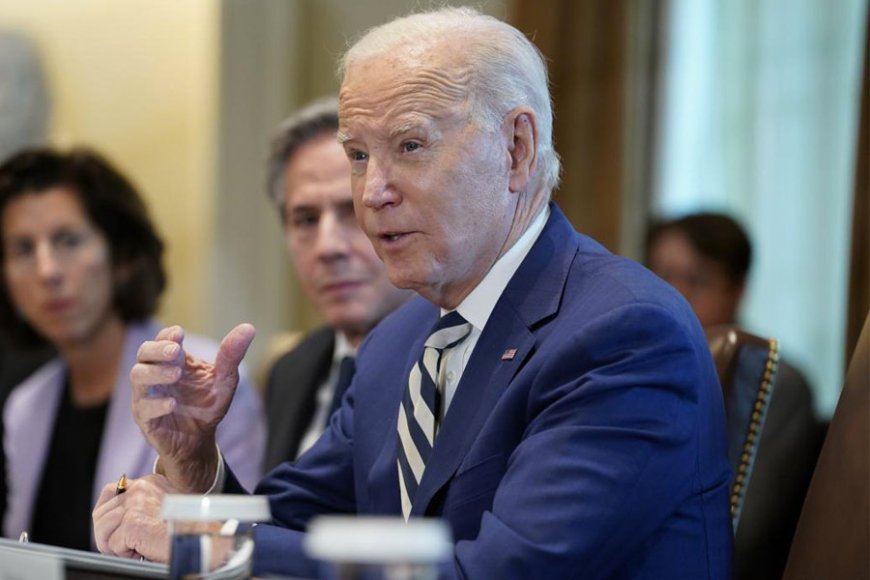US Launches Airstrikes in Response to Drone Attack; Targets Iranian Militias in Iraq and Syria
Biden Warns of Ongoing Response After American Post Attack in Jordan

In response for a drone assault on an American post in Jordan last Sunday that claimed the lives of three service personnel, the US launched significant airstrikes on 85 sites in Iraq and Syria targeting members of the Iranian Revolutionary Guards and associated militia organizations.
Top US officials, including President Joe Biden, have been warning for days that America would retaliate against the militias, emphasizing that it would be a "tiered response" over time rather than a single blow.
The US military response "will continue at times and places of our choosing," according to Biden. "Conflict is not something the United States seeks in the Middle East or anyplace else in the globe. But when the US began executing such attacks on Friday, Biden warned in a statement, "Let all those who might seek to do us harm know this: If you harm an American, we will respond." This past Sunday, Biden said that a drone used by extremist organizations supported by Iran's Islamic Revolutionary Guards Corps (IRGC) killed three American troops in Jordan.
A drone strike at US facility Tower 22, located in Jordan, resulted in the deaths of three US troops and the injuries of over forty more.
Biden was there during the honorable homecoming of these courageous Americans at Dover Air Force Base earlier in the day. He conversed with each family as well.
Under my command, US military personnel attacked locations this afternoon in Syria and Iraq that are used by the IRGC and its allied militia to strike US soldiers. We started responding today. It will go on whenever and wherever we want, according to Biden.
US Central Command reports that American troops launched airstrikes on the IRGC Quds Force and associated militia groups in Syria and Iraq around 4:00 pm EST (2.30 am IST).
Over 85 sites were hit by US military forces using a variety of aircraft, including long-range bombers that were flown in from the US. Over 125 precise weapons were used in the airstrikes.
The CENTCOM said that the targets of the strikes included logistics and munitions supply chain facilities of militia groups and their IRGC sponsors that enabled attacks against US and Coalition forces, as well as command and control operations centers, intelligence centers, rocket and missile storages, and unmanned aerial vehicle storages.
According to Defence Secretary Lloyd Austin, the seven targets of these attacks are locations where US personnel are attacked by the IRGC and its allied militias.
"This marks the beginning of our reaction. In response to the IRGC and associated militias' assaults against US and Coalition Forces, the President has ordered more measures, he stated.
These will take place when and where we choose. The President and I will not put up with assaults on American personnel, but we do not want to go to war in the Middle East or anyplace else. In order to protect the United States, our troops, and our interests, we will take all necessary measures, Austin said.
Compared to other assaults on Iranian-backed militias over the last several weeks, which mostly targeted training or weapon storage locations, the strikes on Friday were noticeably more serious.
However, CNN said that the administration is treading carefully in order to prevent a full-scale battle with Iran in an area already tense due to the ongoing Israel-Hamas war in Gaza, while also attempting to dissuade and halt additional strikes.
John Kirby, a spokesperson for the National Security Council, said, "We believe that the strikes were successful."
Kirby said that the number of militants killed or injured is now unknown to the US. He continued by saying that US military aircraft were now safe. The Joint Chiefs of Staff director, Lt. Gen. Douglas Sims, said on Friday that the hit areas were selected "with an idea that there would likely be casualties" among the IRGC and militia members that utilize them.
The missions made use of B-1 bombers, which are long-range heavy bombers with the ability to deliver both precision and non-precise munitions, a defense official told CNN. According to Sims on Friday, "all of that enhanced by our Transportation Command and our ability to gas and go along the way" allowed the bombers to make a "single non-stop flight" out of the US. In order to "ensure that we're hitting all the right targets," Sims said, the timing of the attacks was planned around favorable weather. According to Iraqi security officials and the mayor of Al-Qaim, US strikes on Saturday morning local time targeted facilities used by the Iranian-affiliated al Hashd al Shabi or Popular Mobilization Units (PMU) in the Iraqi city of Al-Qaim, which is located in the western part of Anbar province along the border between Iraq and Syria.
The spokesman for the Iraqi Armed Forces, Yahya Rasool, denounced the attacks in a statement, calling them a "violation of Iraqi sovereignty." "US aircraft are conducting airstrikes against the city of Al-Qaim and the Iraqi border areas at a time when Iraq is working hard to ensure the stability of the region," said Rasool.
Since October, more than 160 US military installations in Iraq and Syria have been attacked by terrorists supported by Iran. A number of Republican congressmen have advocated for the US to strike straight into Iran in order to send a strong message.
However, government representatives have made it plain that any reaction would be reasonable in order to prevent the situation in the area from becoming worse.
"We have no desire for conflict with Iran. Kirby said CNN on Monday, "We're not looking for a wider conflict in the Middle East."
The White House said on Wednesday that it thought the drone strike in Jordan was carried out by a loose coalition of extremists known as Islamic Resistance in Iraq.
"We think that the Islamic Resistance in Iraq, which is made up of several groups, including Kata'ib Hezbollah, was responsible for organizing, providing resources, and facilitating the attack in Jordan," Kirby said.
He said that Kataib Hezbollah, the strongest force in Iraq supported by Iran, was not the sole organization accountable for earlier assaults on US sites, but he refrained from placing full responsibility on it.
Except for the headline, this story has not been edited by Press Time staff and has been published from a syndicated feed.





















































